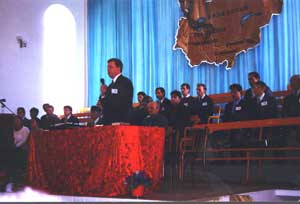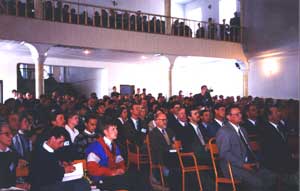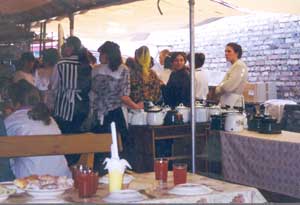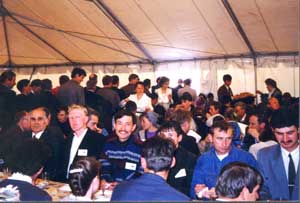Ripe unto Harvest
(Karaganda, Kazakhstan, May 1998)
Walter Sawatsky
 Frants Tissen, May 1998. Credit: Walter Sawatsky. |
There were 44 who stood for the call. Frants Tissen had asked those in the conference who were ready to make a public commitment to serve as missionary where ever God called to act. As the 44 stood in front of us that afternoon, Tissen, Heinrich Vot, and Jacob Enns prayed prayers of commissioning. I wondered whether these 'mustard seeds' were going to produce trees and forests of Christians. This was Central Asia, after all. This was desert terrain, literally and in Christian terms. Yet the missionary conference centered on the theme -- 'look unto the harvest fields'.
I remembered the speaker in Massachusetts back in 1887 who had called for a commitment to evangelize the world in this generation, starting with me, and how 100 young people had stepped forward. We now think of the impact of that event as the beginning of a century of American Protestant mission, that resulted in the emergence of Christian churches around the world -- Mennonites also becoming part of the movement a few decades later. By 1910 the new churches began finding each other in the ecumenical movement and through frequent conferences on world mission. With the eyes of faith they had seen the fields ripe unto harvest, and somewhat like Jesus who first pointed out the human need with that image, they were soon too busy to rest and eat.
 Church planter evangelists at Karaganda church, May 1998. Credit: Walter Sawatsky. |
I recalled Soviet Mennonite talk about harvest fields scarcely ten years ago. Viktor Fast of Karaganda, Kazakhstan had lead 14 representatives to the Mennonite World Conference in Winnipeg in 1990 and announced that they had discovered a mission field around them. When I met with his fellow leaders in Kazakhstan some months later and they talked about witness to the central Asian peoples, I blessed them but inwardly doubted. What did they know about those cultures, those languages, and what might happen if Muslim missionaries began calling people back to faith? Where would they get the money?
As we know, very much money has been sent to the former Soviet Union from America during the past decade. Much of it has been spent wastefully, often used by college-trained and even seminary-trained Western missionaries who seemed to know even less of the culture, history, or even understand what "ripe harvest fields" really meant in the post-Soviet context. A major result has been deep antagonism from Orthodox Christians, anti-religious legislation once again, and even violent mistreatment of local workers.
 Women preparing food at Karaganda mission conference, May 1998. Credit: Walter Sawatsky. |
The Central Asian Mennonite/Baptists mission groups got the bulk of their assistance from recent emigrants in Germany who sent food, books, money, and sponsored their own youth as short-term missionaries. North American Mennonite agencies supported from the background.
Now in May 1998, Frants Tissen was hosting a conference of 500 missionaries from Central Asia. There were very few of us foreigners present. The speakers were local leaders, and the foreign guests were only invited to the podium to be interviewed as a group. The hosts were making the point that they saw themselves as missionary church, not specialists on temporary assignment. When they asked me to explain why Mennonites were assisting but apparently not starting their own Mennonite denominations, I replied that our vision, particularly in MCC with which I was directly associated, had consistently been to do what we could to enable and empower local churches and to cooperate with their denominational structures. It was obvious that the "German Mennonites" still provided primary leadership, even if most of their members had emigrated, but they could do so because they had chosen to be inwardly united with Evangelical Christians and Baptists, sister traditions.
Though the 500 missionaries meeting in the new church building in Karaganda were mainly Ukrainians, Russians and Germans, nevertheless the harvesting had begun. About 70 of their number were Kazakh, Kirghiz, Uzbek, Tadzhik, Turkmen and other Asiatic ethnic communities. They described congregations organized as distinct Kirkhiz-speaking and Kirkhiz-led fellowships. Each missionary had a story - we heard only a few.
One man had heard the gospel in prison where he was serving out a longer sentence due to committing a violent crime. Frants Tissen had visited regularly. Finally the man had made his confession before God, found peace, and looked at life anew. Upon his release he had come to Karaganda where Tissen had been his mentor as he discovered his own gift of evangelism. But he could not stop thinking about the village in central Kazakhstan which he had left, where he needed to return to make his confession and restitution. The Karaganda church supported him, sent him off, and now he reported back on one year of ministry and the emergence of a small fellowship.
They stood together at the podium, a young German man in his mid-twenties, his wife with kerchief head covering and baby on her arm, as they reported their tale of harvest. With three pre-school children they had set out last year for a distant Kazakh village where there was no Gospel witness. Their congregation near Karaganda had promised to assist, but most members were in a survival mode, the Kazakh currency worth even less than the ruble. He found some work in carpentry, they raised some vegetables, and were starting to understand the local language -- though fortunately some could converse in Russian, the lingua franca of the former Soviet Union. The young couple seemed so little, but so deeply dedicated, that even if no western agency would learn of them, you knew they were the 'harvest workers' Jesus spoke of. Their manner with each other, with their children, and their love toward their villagers was making the villagers ask about this Jesus.
 Church planter evangelists at meal time, Karaganda, May 1998. Credit: Walter Sawatsky. |
What will become of the 44? How many more will join them? How long will fellow Christians as far away as North America remember them, especially when they pray? Will they care as much when the leaders of the next conference are not named Frants or Jacob, but Abdul and Mohammed?
 June 2000
vol. 55 no. 2
Back to Table of Contents
June 2000
vol. 55 no. 2
Back to Table of Contents